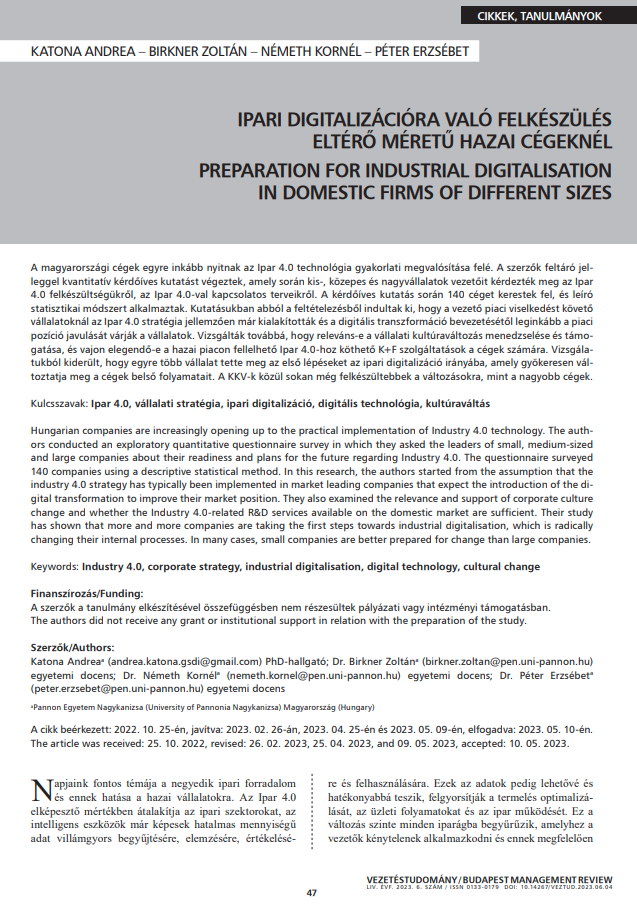Preparation for industrial digitalisation in domestic firms of different sizes
DOI:
https://doi.org/10.14267/VEZTUD.2023.06.04Keywords:
Industry 4.0, corporate strategy, industrial digitalisation, digital technology, cultural changeAbstract
Hungarian companies are increasingly opening up to the practical implementation of Industry 4.0 technology. The authors conducted an exploratory quantitative questionnaire survey in which they asked the leaders of small, medium-sized and large companies about their readiness and plans for the future regarding Industry 4.0. The questionnaire surveyed 140 companies using a descriptive statistical method. In this research, the authors started from the assumption that the industry 4.0 strategy has typically been implemented in market leading companies that expect the introduction of the digital transformation to improve their market position. They also examined the relevance and support of corporate culture change and whether the Industry 4.0-related R&D services available on the domestic market are sufficient. Their study has shown that more and more companies are taking the first steps towards industrial digitalisation, which is radically changing their internal processes. In many cases, small companies are better prepared for change than large companies.
Downloads
References
Balogh G., Sipos N., & Rideg A. (2020). A javadalmazási rendszerek hatása a magyarországi kis- és középvállalati szektorban. Közgazdasági Szemle, 67(12), 1217– 1244. https://doi.org/10.18414/ksz.2020.12.1217
Bordeleau, F.-È., & Felden, C. (2019). Digitally transforming organisations: A review of change models of Industry 4.0. In Proceedings of the 27th European Conference on Information Systems (ECIS). Stockholm & Uppsala, Sweden, June 8-14, 2019. https://aisel.aisnet.org/ecis2019_rp/49
Brettel, M., Friederichsen, N., Keller, M., & Rosenberg, M. (2014). How virtualization, Decentralization and network building change the manufacturing landscape: An Industry 4.0 Perspective. Zenodo. https://doi.org/10.5281/zenodo.1336426
Demeter, K., Losonci, D., Szász, L., & Rácz, B. G. (2020). Magyarországi gyártóegységek ipar 4.0 gyakorlatának elemzése – technológia, stratégia, szervezet. Vezetéstudomány, 51(4), 2-14. https://doi.org/10.14267/VEZTUD.2020.04.01
Digital Economy and Society index (DESI). (2021). Shaping Europe‘s digital future. (n.d.). https://digital-strategy.ec.europa.eu/en/library/digital-economy-and-society-index-desi-2021
Filep, R. (2020). Menedzsment módszerek az ipar 4.0 tükrében. International Journal of Engineering and Management Sciences, 5(1), 507–514. https://doi.org/10.21791/ijems.2020.1.41
Hofmann, E., & Rüsch, M. (2017). Industry 4.0 and the current status as well as future prospects on Logistics. Computers in Industry, 89, 23–34. https://doi.org/10.1016/j.compind.2017.04.002
Horváth, D., & Szabó, Z. R. (2017). A negyedik ipari forradalom vezetési aspektusai. In Mérleg és Kihívások X. Nemzetközi Tudományos Konferencia = „Balance and Challenges” X. International Scientific Conference ( 700-714). Miskolci Egyetem Gazdaságtudományi Kar, Miskolc-Egyetemváros. from http://unipub.lib.uni-corvinus.hu/3305/
Katona, A., Göllény-Kovács N., & Péter E. (2020). Az Ipar 4.0 vizsgálata a stratégia és szervezet, munkavállalók és új digitális technológiák oldaláról. In XXVI. Ifjúsági Tudományos Fórum (pp. 1-6). Keszthely: Pannon Egyetem.
Kotler, P. (1998). Marketing management: Analysis, planning, implementation and control. Harlow: Prentice Hall.
Mohelska, H., & Sokolova, M. (2018). Management approaches for industry 4.0 – the organizational culture perspective. Technological and Economic Development of Economy, 24(6), 2225–2240. https://doi.org/10.3846/tede.2018.6397
Nagy, J. (2019). Az ipar 4.0 fogalma és kritikus kérdései – vállalati interjúk alapján. Vezetéstudomány, 50(1), 14–26. https://doi.org/10.14267/veztud.2019.01.02
Nagy, J., Oláh, J., Erdei, E., Máté, D., & Popp, J. (2018). The role and impact of Industry 4.0 and the internet of things on the business strategy of the value chain – the case of Hungary. Sustainability, 10(10), 3491. https://doi.org/10.3390/su10103491
Obermayer, N., Csizmadia, T., Hargitai, D. M., & Kigyós, T. A. (2021). az ipar 4.0 implementációval kapcsolatos vezetői motivációk és akadályozó tényezők elemzése hazai vállalatvezetők véleménye alapján. Vezetéstudomány, 52(2), 60–72. https://doi.org/10.14267/veztud.2021.02.06
Obermayer, N., Csizmadia, T., & Hargitai, D. M. (2022). Influence of Industry 4.0 Technologies on corporate operation and Performance Management from human aspects. Meditari Accountancy Research, 30(4), 1027–1049. https://doi.org/10.1108/medar-02-2021-1214
Orzes, G., Rauch, E., Bednar, S., & Poklemba, R. (2018). Industry 4.0 implementation barriers in small and medium sized enterprises: A focus group study. In 2018 IEEE International Conference on Industrial Engineering and Engineering Management (IEEM). https://doi.org/10.1109/ieem.2018.8607477
Parker, C., Scott, S., & Geddes, A., (2019). Snowball sampling. London: SAGE.
Péter, E., & Németh, K. (2017). Changing trends based on mutuality? Paradigm shift in corporate culture. In Zborník medzinárodnej vedeckej konferencie Univerzity J. Selyeho (pp. 3 78-387). Komárno: Selye János Egyetem.
Porter, M., Heppelmann, J.E., Iansiti M., & Lakhani, K. R. (2020). How smart, connected products are transforming companies. Harvard Business Review, 93, 1-37. https://hbr.org/2015/10/how-smart-connected-products-are-transforming-companies
Prause, G. (2015). Sustainable business models and structures for industry 4.0. Journal of Security and Sustainability Issues, 5(2), 159–169. https://doi.org/10.9770/jssi.2015.5.2(3)
Schwab, K. (2018). The Global Competitiveness Report 2018. Geneva: World Economic.
Whysall, Z., Owtram, M., & Brittain, S. (2019). The new talent management challenges of industry 4.0. Journal of Management Development, 38(2), 118–129. https://doi.org/10.1108/jmd-06-2018-0181

Downloads
Published
How to Cite
Issue
Section
License
Copyright (c) 2023 Vezetéstudomány / Budapest Management Review

This work is licensed under a Creative Commons Attribution 4.0 International License.
Authors assign copyright to Vezetéstudomány / Budapest Management Review. Authors are responsible for permission to reproduce copyright material from other sources.

